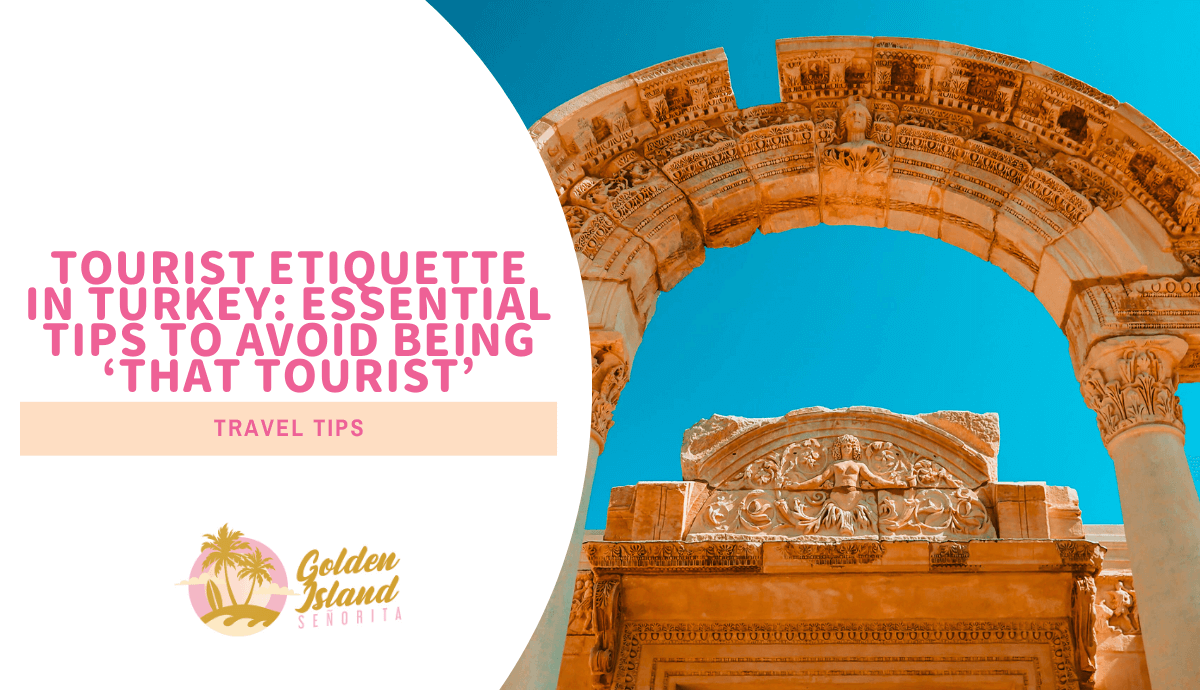Turkey, a vibrant fusion of East and West, is known for its rich cultural history, stunning landscapes, and warm hospitality. Whether you’re wandering through the bustling bazaars of Istanbul, marveling at the ancient ruins of Ephesus, or floating in a hot air balloon over the surreal landscapes of Cappadocia, respecting the local customs is crucial to having a positive and memorable experience.
I had a quick (and somewhat spontaneous) chat with our tour guide, Mr. Oktay while we were heading to Ankara. He shared some interesting insights about the little things tourists sometimes do that locals might find annoying or even offensive.
In this article, we’ll dive into the essential tourist etiquette in Turkey to help you avoid any awkward situations and ensure you’re a gracious visitor. From gestures and behavior to dress codes and language, these tips will help you blend in like a pro and avoid being ‘that tourist.’
Tourist Etiquette in Turkey
1. Pointing with Your Finger
Why It Should Be Avoided
Pointing directly at people or things with your finger is considered impolite in many cultures, and Turkey is no exception. It can be perceived as rude or confrontational, especially if you’re pointing at a person. This is seen as an invasion of personal space and a lack of manners.
What to Do Instead
Instead of pointing with your finger, use your whole hand or nod in the direction of what you are referring to. If you need to signal someone’s attention, a subtle hand gesture with an open palm is considered more polite and respectful. This small adjustment will go a long way in respecting the etiquette in Turkey.
2. Gesturing Someone to Come with a Beckoning Motion with Your Fingers
Why It Should Be Avoided
In many Western cultures, beckoning someone with your fingers is casual and harmless, but in Turkey, it can come across as inappropriate or even offensive. This gesture may be associated with summoning animals or treating someone as inferior, which is not the impression you want to make.
What to Do Instead
When you need to get someone’s attention or call them over, it’s more polite to raise your hand with the palm facing down and make a slow, downward waving motion. This is the acceptable and polite way to beckon someone, aligning with the etiquette in Turkey.
3. Sitting with Legs Crossed or Sprawled Manner
Why It Should Be Avoided
Sitting cross-legged in front of elders is seen as disrespectful due to cultural norms emphasizing respect for older individuals. This posture can appear too casual or dismissive, especially in formal settings. Traditionally, maintaining a modest, upright posture shows humility and attentiveness.
What to Do Instead
If you’re in a more formal or religious setting, sit with your feet flat on the ground or cross your legs at the ankles. This is a simple yet significant way to show respect for local customs and demonstrate proper etiquette in Turkey.
4. Speaking Loudly in Public Places
Why It Should Be Avoided
While Turkey is lively and bustling, speaking too loudly in public places, such as restaurants, markets, or public transportation, can be seen as inconsiderate. Turkish people generally value peaceful and respectful communication, especially in public spaces.
What to Do Instead
Keep your voice at a moderate level, even when you’re excited or animated. Being mindful of your volume not only respects the local etiquette in Turkey but also allows you to blend in more easily with the locals, who tend to speak in a more moderate tone in public.
5. Tipping Too Little or Not at All
Why It Should Be Avoided
Tipping is a customary practice in Turkey, especially in restaurants, cafes, and for services such as taxis or hotel staff. While tipping isn’t as rigidly enforced as in some countries, leaving too little or nothing at all can be seen as a lack of appreciation for the service provided.
What to Do Instead
A good rule of thumb is to leave around 10% to 15% of the total bill in restaurants. For taxis, rounding up the fare is a common practice. If you’re unsure, observe what the locals do or ask the staff what’s customary. Following this practice will help you respect the etiquette in Turkey and leave a good impression.
6. Disrespecting Elderly People
Why It Should Be Avoided
In Turkish culture, respect for elders is deeply ingrained, and failing to show it can be seen as highly disrespectful. Whether you’re on public transportation or in a social setting, not offering your seat to an elderly person or not acknowledging them properly can come off as rude.
What to Do Instead
Always show politeness and consideration toward older individuals. If you’re seated on a bus or train, be ready to offer your seat to an elderly person. A friendly greeting or a respectful nod when you encounter elderly locals will go a long way in honoring the etiquette in Turkey.
7. Ignoring Dress Codes in Certain Sites
Why It Should Be Avoided
Turkey is a country where modern and traditional cultures intersect. While casual dress is acceptable in many parts of the country, ignoring dress codes in religious or conservative sites, such as mosques or smaller towns, can be seen as highly disrespectful.
What to Do Instead
When visiting religious sites, such as the Blue Mosque in Istanbul, make sure to dress modestly. Women should cover their heads, shoulders, and legs, while men should avoid wearing shorts. Carrying a scarf or shawl can be handy. Respecting these customs is not only polite but also shows an understanding of the etiquette in Turkey.
8. Disrespecting Atatürk’s Memory
Why It Should Be Avoided
Mustafa Kemal Atatürk, the founder of modern Turkey, is highly revered. Disrespecting his memory, whether by making jokes or disparaging comments, is taken very seriously by Turkish people. In fact, there are laws in place that protect Atatürk’s legacy.
What to Do Instead
It’s best to speak about Atatürk with respect, or simply avoid the topic if you’re unsure. If his name comes up in conversation, showing admiration for his role in Turkey’s history will demonstrate that you’re aware of the etiquette in Turkey and respect the country’s national pride.
9. Haggling Aggressively
Why It Should Be Avoided
Haggling is a common practice in Turkey, especially in markets and bazaars, but there’s a fine line between good-natured bargaining and aggressive haggling. Being too pushy, raising your voice, or getting upset over the price can offend the vendor and create an unpleasant experience for both parties.
What to Do Instead
Approach haggling with a light-hearted attitude. It’s expected that you’ll negotiate, but do so with a smile and respect. If you can’t agree on a price, thank the vendor and walk away politely. This shows good manners and respect for the etiquette in Turkey.
10. Assuming Everyone Speaks English
Why It Should Be Avoided
Though many people in tourist areas of Turkey speak English, it’s not a given everywhere. Assuming everyone understands English can come off as presumptuous and disrespectful, especially in more rural areas or smaller towns.
What to Do Instead
Learn a few basic Turkish phrases to show that you’re making an effort to connect with the locals. Simple phrases like “Merhaba” (hello), “Teşekkür ederim” (thank you), and “Lütfen” (please) can go a long way in making a positive impression. This small gesture shows that you’re respecting the local etiquette in Turkey and trying to integrate, even if just a little.
PS: Mr. Oktay also taught us a really helpful word: “indirim,” which means “discount”.
Final Thoughts: Blend In Like a Local with Good Etiquette
Traveling to Turkey is a remarkable experience that allows you to explore both ancient and modern worlds. However, being a considerate and thoughtful traveler is essential for having an authentic and positive experience. Following these tips on etiquette in Turkey will not only help you avoid being ‘that tourist’ but will also allow you to build better connections with the locals, enjoy richer cultural experiences, and leave Turkey with beautiful memories.
When in doubt, observe what the locals do and take cues from them. After all, part of the beauty of travel is embracing new customs and respecting the cultural differences that make each destination unique. So pack your bags, brush up on your etiquette in Turkey, and get ready to immerse yourself in the wonders of this incredible country.
Special Thanks to:
Oktay Çalık, with an impressive 32 years of experience in the tourism sector, he’s your go-to freelance guide for unforgettable adventures in Turkey. Oktay held a bachelor’s degree in business management and a master’s degree in history, making him not just knowledgeable but also passionate about sharing insights that enrich your travels. Whether you’re exploring historical sites or seeking local treasures, Oktay is here to ensure you have a fantastic experience.
References:
Rough Guides, “Essential Turkish Etiquette for Travelers.”
Property Guides, “Understanding Turkish Customs”
Turkey Travel Planner, “Tipping in Turkey”
Magnificent Travel, “Customs in Turkey”
Plavel, “Remembering Mustafa Kemal Atatürk: The Father of Modern Türkiye”

